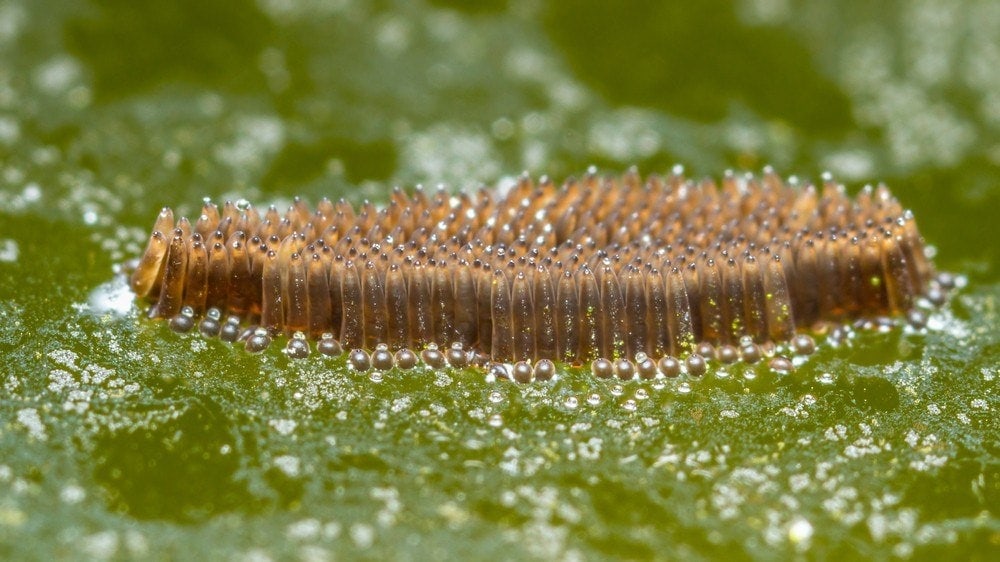Mosquitos are no fun, which is something that most people and animals out there will agree on. Sure, some animals like eating them, but nobody enjoys being stung by them. Even worse is when you are surrounded not just by 1 of these things, but by hundreds of them. Unfortunately, outdoor ponds, fish or not, will often suffer from mosquito problems.
Mosquitos love water. They breed in it, they drink it, and more, which means that they are attracted to your pond. However, there are some ways you can help to prevent them from coming to your pond, or at least from being able to breed in it. This is what we are here to help you with today. Mosquitos are joy killers and bloodsuckers, so let’s get rid of them for good, at least where your pond is concerned.

Causes Of Excessive Mosquitos In Ponds
There are a few reasons why there might be a lot of mosquitos in your pond, as well as mosquito larvae.
Many people might not realize that the chemistry of the water is important to insect larvae. Excess nutrients and an imbalance of pH and nitrates can create better conditions for mosquitoes’ growth, resulting in larger populations around your pond. These imbalances will also make it more difficult for fish and plant life to thrive and could even kill them.
The easiest way to check and maintain water chemistry is to test it frequently with pond test strips. These test strips will tell you the pH, nitrite content, water hardness, and more so you can see current levels and take steps to correct them. You can add safe products to the water, like pH increaser and pH decreaser, that will get your pond where it needs to be without harming the fish. Correct levels will make the water less hospitable to larvae while allowing fish and plants to thrive which will help reduce insect populations.
Before we take a look at the solutions, let’s take a look at the primary causes.
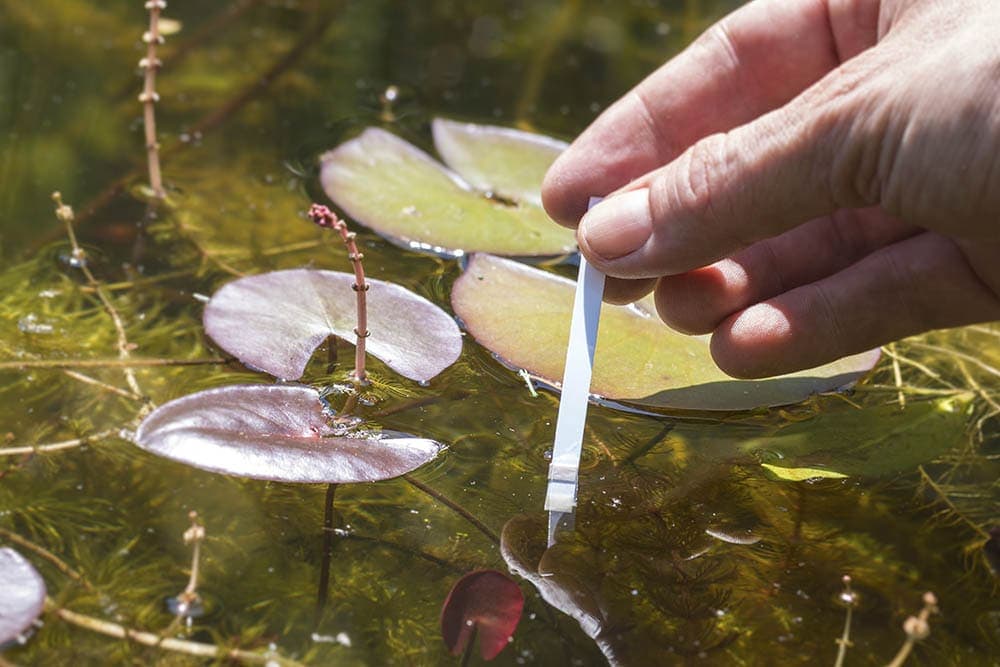
- A lack of natural predators will definitely cause a rise in mosquito populations. Mosquitos are really efficient at multiplication, so having a lack of predators will allow them to multiply unhindered. If you have no fish, frogs, or bats around, it could be the reason why there are so many bloodsuckers in the air.
- Mosquitos love stale and stagnant water. They breed well when there is a lot of mud around and when there is water that does not move. Therefore, if you have a pond with poorly aerated water that is more or less still, mosquitos will multiply rapidly.
- If you have a dirty and unmaintained pond, combined with unmaintained equipment, it could also cause an explosion in mosquito populations. A filter that is not clean and maintained loses power, which then leads to a lack of water flow and aeration.
Are Mosquitos Harmful To My Pond?
Ok, so mosquitos and their eggs are not really overly harmful to a backyard pond. In fact, they do help make up a valuable part of the ecosystem. In this case, they act as food. Fish, birds, bats, and many other animals eat tons of mosquitos on a daily basis. They are a food source for many animals, with many small predators depending on mosquitos for sustenance.
However, in rare cases, mosquitos can cause problems with pond fish, especially Koi fish and goldfish. Mosquitos can transmit certain bacteria and diseases which can harm your pond fish. Although this is fairly rare, it can happen.
Now, these bacteria or diseases usually will not kill your fish, but they can make them weaker. Fish that are already weaker due to bacteria from mosquitos are then more susceptible to other diseases, bacteria, and parasites that may be in the water.
If you are really worried about this, there are some things that you can do to kill mosquitos and their larvae in your pond. The real problem that most people have with mosquitos is that their bites hurt and get itchy.
People, not fish, are the ones that tend to hold a grudge here. Not that there is anything wrong with that, because mosquito bites are definitely not pleasant at all, plus of course the risk to your fish is not ideal either.
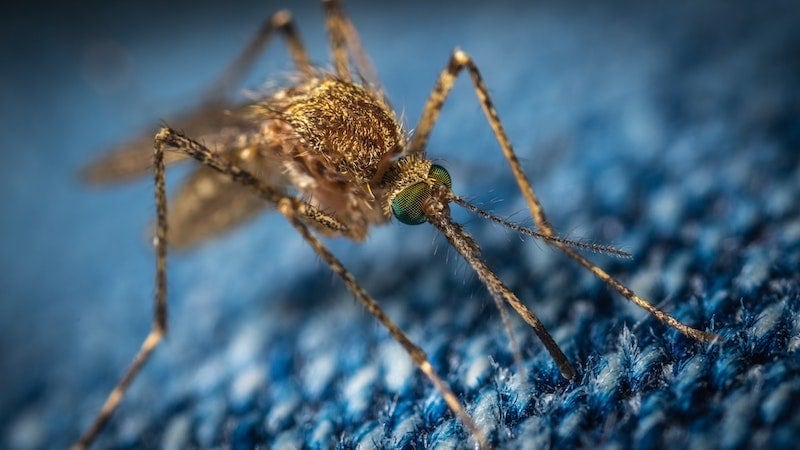

The 4 Methods To Get Rid Of Mosquito Larvae In Plant Water
Let’s go over some of the best ways to kill mosquitos and mosquito larvae in plant water and pond water.
Keep in mind that not all of these options will directly kill mosquitos and their larvae, but they will definitely help stop the mosquitos from breeding in your pond.
We do want to stress that we are not going to talk about any chemical options here, at least not ones that can harm fish or plants. You probably have fish in your pond, so telling you to dump a bunch of insecticide in your pond won’t do you any good.
If you cannot kill the mosquito larvae in your pond without harming your fish, there is not much point in this whole exercise. We would rather prevent mosquitos from breeding in a pond rather than outright killing them while also endangering the fish at the same time.
1. Mosquito Dunks & Bits
One of the most effective ways of actually killing mosquitos and mosquito larvae in your pond is to use either mosquito dunks or mosquito bits. To be clear, dunks are just much larger and more powerful versions of the bits.
The dunks are great to put in ponds, a couple here and a couple there. It’s a good option if there are mosquitos breeding in one specific space more than anywhere else, or if they are just in the water.
On the other hand, the bits are smaller and more numerous, so they are easier to spread around a larger surface. In layman’s terms, the dunks are better for treating one specific area, whereas the bits are a little more widespread. Whatever the case may be, both of these things, the dunks and bits, are the same thing. They do the same thing; they are just different sizes.
On that same note, because the dunks are much larger, they are best used for slow and long-term control, whereas the smaller bits are much faster acting, but not as long-lasting. You can always use the bits to kick start the mosquito control, and then use the dunks to keep the mosquito population low over a longer period of time.
It is more or less the fast-acting vs long-lasting debate. We would recommend going with both.
2. Natural Predators
Another thing that you can do to eliminate mosquitos and mosquito larvae in your pond is to insert natural predators into the equation. Now, you probably already have some fish in your pond, but maybe not enough or the right kind.
If you add a few more Koi fish, goldfish, or other pond fish which are known to east mosquitos and mosquito larvae, the number of mosquitos will drop quite drastically.
Another option to go with is tadpoles, or better yet, frogs. Frogs won’t hurt the pond ecosystem, but they will definitely eat up a whole lot of mosquitos and their larvae. Some people even go so far as to attract bats to their ponds.
Using special lights and bat boxes (like birdhouses for bats), you can attract bats to your pond. Bats eat a heck of a lot of mosquitos on a daily basis, making them one of the most effective natural predators for mosquito control. A bat box will help attract bats to come live on your property. While many people are terrified of bats, they pose no danger to humans, and a single bat can eat more than 6,000 mosquitos in a single night, making them one of the best natural ways to control these insects. Some experts suggest there are 32% fewer larvae in areas where there are bats.
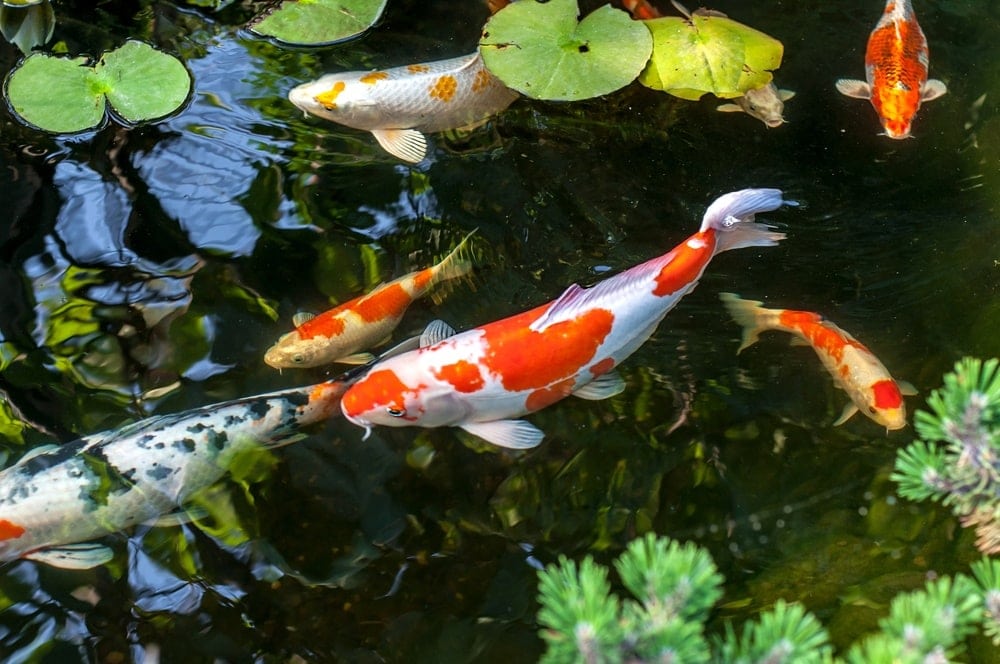
3. Increasing Aeration & Water Flow
Mosquitos do best in stagnant water that does not move much. Their larvae need relative calm in order to properly develop and hatch, as is the case for mosquito breeding too. Therefore, if you increase water flow and aeration, it should help cut down on the number of mosquitos that decide to make your pond their home.
Simply put, if the water is well aerated and is always in motion, mosquitos will either not be able to breed in the pond, or the eggs will not be able to develop and hatch. Getting a bigger filter, turning up the flow rate, and adding some air stones to the mix should help quite a bit here.
You can also choose to go with some nice water features like fountains and waterfalls. These things look nice, they keep water moving, and they aerate the water too, all in one shot.
Larger fountains can also add a considerable amount of movement to the water, preventing mosquitoes from laying their eggs. You can also use an electric pump to create a waterfall which will add oxygen and movement to the water.
If you don’t want to use house electricity to power your pumps because of potential dangers or because the pond is too far away, solar-powered pumps can do the same thing, especially if your pond receives plenty of direct sunlight. Another option is windmill power, but this option can be quite expensive.
4. Try To Minimize Mud, Out Of Water Plants, & Food Sources
This is going to be hard to do as your pond probably has quite a few plants, which means that mosquitos will also have food sources. However, anything you can do to minimize the presence of mud, above water plants that are not in the water, and minimize food sources will help here.
This is easier said than done, but it is possible still. Mosquitos love mud, so getting rid of it should be a big help.
Trees around your pond can also add many leaves to the water, which can clog your pump. These leaves can also prevent light from penetrating the pond and will provide a place for mosquitos to lay eggs. Removing these leaves with a pool skimming net will help eliminate this problem, and it will also work to remove ant algae you see forming on the surface. Regularly remove any other litter that might find its way into your pond, especially if it floats, because it can make a great place to lay eggs.
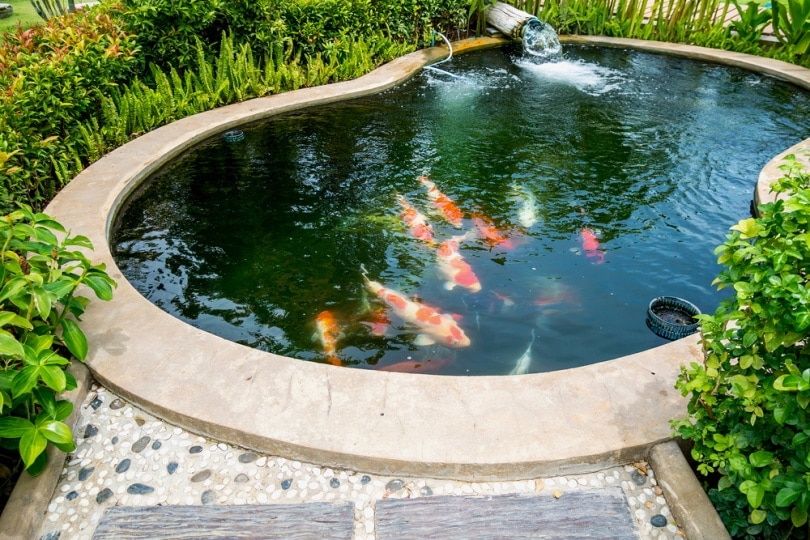

Conclusion
The bottom line is that mosquitos suck, both literally and figuratively. The above methods of killing and controlling mosquitos definitely work best when used in combination. If you have had enough mosquito bites for one day, we would definitely recommend giving any or all of the above methods a shot.
You Might Also Be Interested In:
- How to Aerate a Pond Without Electricity (Best Methods)
- How to Get Rid of Leeches in a Pond (Without Harming Fish)
Featured Image Credit: thatmacroguy, Shutterstock
